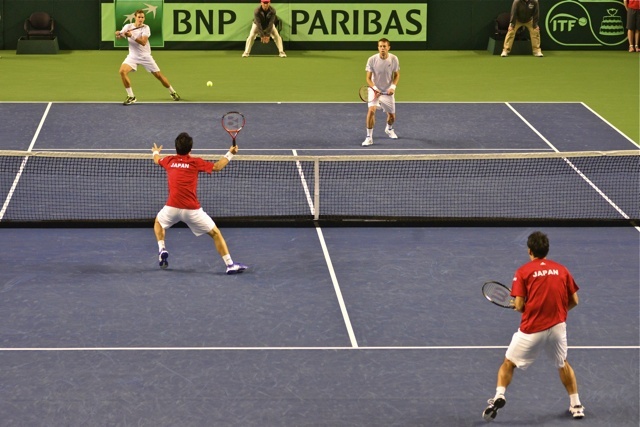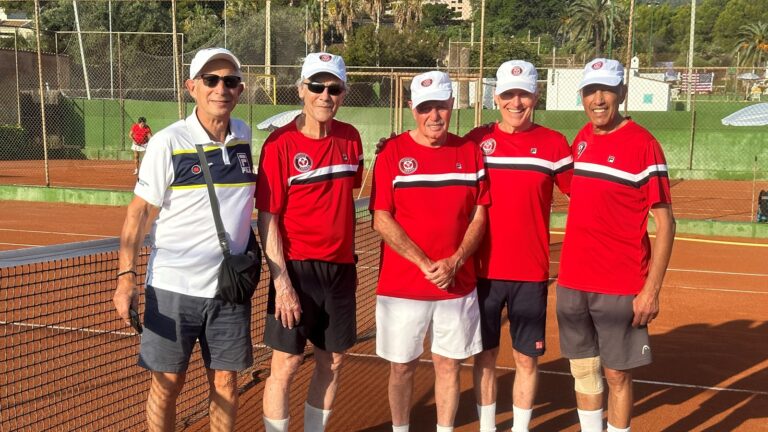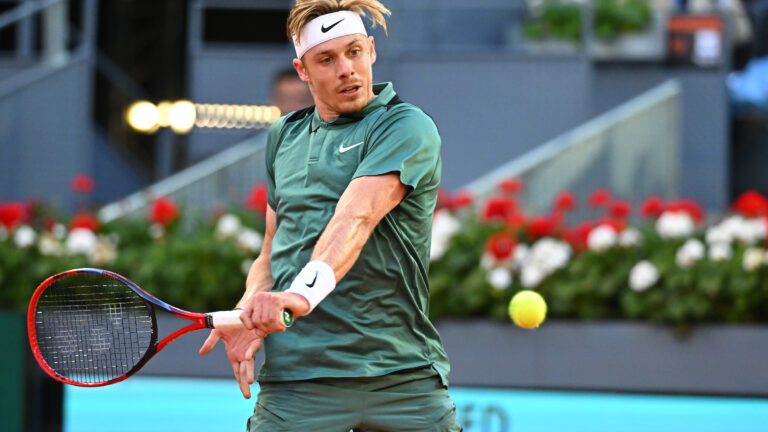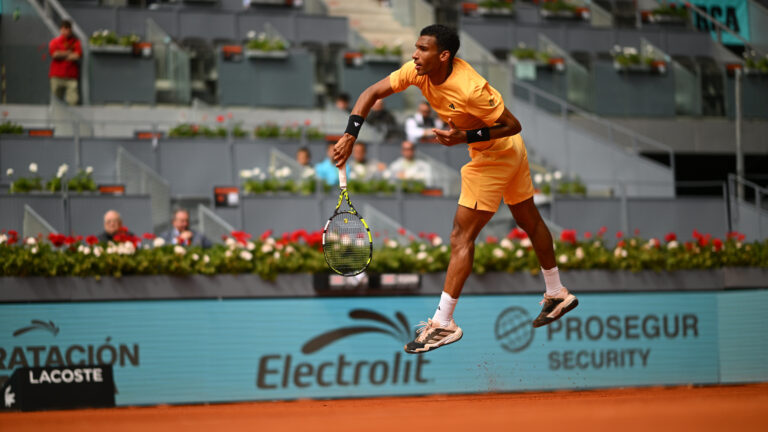
Bo Mon Kwan
Daniel Nestor often talks about the small margins that determine the outcomes of doubles matches. On Saturday, those margins were indistinguishable for about the first two hours and 54 minutes of the match featuring Nestor and Vasek Pospisil versus Go Soeda and Yasutaka Uchiyama of the visiting Davis Cup Japanese team.
The final score reflects the seesaw nature of the dramatic confrontation – Nestor and Pospisil prevailing 7-5, 2-6, 6-3, 3-6, 6-3 in two hours and 58 minutes.
After a first set that saw the Canadians rally from a break down at 1-2 to break Soeda twice, the second time closing out the set 7-5, the dye was cast early in each of the subsequent three sets by early breaks.
That pattern ended in the fifth set as the two teams went on serve to 4-3 for Canada – with only one break point, saved by Uchiyama in the sixth game with a tricky overhead winner off a floating ball that was not quite the ‘gimme,’ in the circumstances, that it might have appeared to be.
But just when it seemed the set might spiral into the territory of 15-13 in the fifth set of Canada’s 2013 doubles win over Italy in Vancouver – or even the 10-8 in the final set victory against Serbia in Belgrade a few months later – it was over almost before people could believe it.
Soeda served at 3-4 and lost his serve on four points – a forehand volley wide, a blast at Uchiyama at the net that he couldn’t handle, another hard blast that resulted in a volley over the baseline and finally a double fault that landed way long.
You had to feel for the Japanese who had pushed Nestor and Pospisil to the hilt, especially after Pospisil finally served out the match to love, capped by a Nestor forehand poach volley that he drilled at a defenseless Uchiyama.
It was a satisfying victory because Nestor had lost both his Davis Cup doubles in 2014 – with Frank Dancevic against the Japanese in Tokyo in February and with Pospisil against Colombia in Halifax in September – and he wanted to redeem himself.
Asked about the oh-so sudden end to the match, Nestor said, “I think it’s just a matter of connecting on a few shots consecutively. They played very well on serve and when we had minor chances, they seemed to come up with the big shots. It’s a matter of staying patient and that’s what doubles is – getting a couple of shots in a row together and playing well together. We were able to do that in the fifth set.”
The crowd may have been a factor in finally getting to the Japanese players – although a loud Japanese contingent also contributed to the volume. When the teams came out at 3-2 and 4-3 in the fifth set, there were gigantic roars that rocked the Doug Mitchell Thunderbird Sports Centre, part encouragement from the partisans for their favourites and part just an emotional release in appreciation for the thrilling tennis they were witnessing.
Such an abrupt conclusion to the match was probably equal parts Nestor and Pospisil stepping up at the very end, and the Japanese pair finally feeling the pressure – especially because they had played from behind after the first set.
“We were always ahead which was key,” noted Nestor, who repeatedly said he was disappointed in himself for getting frustrated about how close the match was in the first two sets.
“We talked about (Kei) Nishikori playing,” Nestor said, “but realistically I don’t know if the level would have been that much better if he had played. It might even have been better for us because we would have handled the great player better – and expected it more.”
Nestor is No. 5 in the world in doubles and Pospisil is No. 15, which would appear to be a mismatch against the No. 22-ranked Uchiyama and Soeda, No. 369.
“It happens all the time – people back home are always asking me ‘how did you lose to those guys?’” Nestor said light-heartedly. “They don’t know who they are, but this happens all the time. I think you just have to throw out the rankings, especially on fast courts.
“In Davis Cup, you’re playing for your country and you have a week to prepare. I think a lot of singles guys playing doubles when they practice for a whole week, they’re going to be better than at a regular tournament where they play singles and then just show up to play doubles.”
Captain Martin Laurendeau admitted what a lot of people thought Nishikori would play the doubles, especially after he won his singles match against Pospisil in three sets on Friday. “I was surprised, and I think some of the guys were too – we were expecting a switch,” he said referring to the Japanese team’s original doubles line-up of Soeda and Uchiyama. “Especially the way Nishikori played in Tokyo last year – he was really inspired and he was all over the court. For a guy who doesn’t play regularly on tour, he’s really comfortable playing doubles.
“We’ve got two guys with a combined ranking of 19 (actually 20) and former Wimbledon champions and, even with the home court advantage, it’s still a very, very difficult match. You’ll see five setters all over the place in the Davis Cup World Group, four or five setters…very few in three sets.”
Worth noting, there was no better a textbook example of that than on Saturday when the world’s best team – Bob and Mike Bryan – being forced to play five sets before overcoming unheralded Britons Jamie Murray and Dominic Inglot 6-3, 6-2, 3-6, 6-7(8), 9-7 in the USA’s tie in Glasgow, Scotland.
So, Canada now heads into the final day on Sunday with a 2-1 advantage as it attempts to reach the quarter-finalsJuly 17-19 away in either Belgium or Switzerland (the Belgians lead 2-1 going into the final day at home in Liege versus a Swiss squad without Roger Federer and Stan Wawrinka.)
Sunday begins (1 p.m. PDT or 4 p.m. EDT) with world No. 6 Milos Raonic against No. 4 Nishikori in the highly anticipated marquee match-up of the tie.
“Everybody would rather be up 2-1 than down 2-1,” said Laurendeau, “so hopefully it allows Milos to breathe a little easier and begin the match a little more relaxed, even if it’s just a tiny percentage, to be loose and play his game a little bit more comfortably.”
A look at the Raonic – Nishikori head-to-head below shows just how competitive their rivalry has been. They have split their last four meetings – including the two they have played in Grand Slam events – and the score of their last match in the Brisbane semi-finals in January (no service breaks) indicates just how little separates them.
The fast Premier Court laid in the arena on the University of British Columbia campus would appear to favour Raonic – it certainly does with his arguably world’s best serve. But once the rallies begin, the advantage could swing to Nishikori because he will be able to get more balls to Raonic’s backhand, not allowing him the time to run around it and crush his lethal forehand.
Putting numbers on it, it’s hard to see it as anything other than a 50-50 proposition.
“It’s going to be a beauty,” said captain Laurendeau
HEAD-TO-HEAD: Nishikori leads Raonic 4-2
2015: Brisbane (hard) – Raonic 6-7(4), 7-6(4), 7-6(4).
2014: Tokyo (hard) – Nishikori 7-6(5), 4-6, 6-4
2014: US Open (hard) – Nishikori 4-6, 7-6(4), 6-7(6), 7-5, 6-4
2014: Wimbledon (grass) – Raonic 4-6, 6-1, 7-6(4), 6-3
2014: Madrid (clay) – Nishikori 7-6(5), 7-6(5)
2012: Tokyo (hard) – 7-6(5), 3-6, 6-0
If Raonic was to lose, the tie would come down to a fifth match between Pospisil and Tatsuma Ito, who was beaten 6-2, 6-1, 6-2 by Raonic on Friday. (There’s always the chance that Frank Dancevic could be substituted for Pospisil or Soeda for Ito.)
“Even though it was a long match,” Laurendeau said about Pospisil’s preparedness for Sunday, “I’m not worried about his physical state. He wants to win so bad that he’ll be ready to go.”
Pospisil was treated on court during Saturday’s doubles for what he called “tightness” in his right shoulder. He minimized the severity of it and said that more treatment would have him ready if he’s needed for the fifth match.
“I’m feeling good physically,” said the world No. 62 shortly after the doubles ended on Saturday. “No problems, pain or fatigue – well maybe a bit now but by tomorrow morning I’ll be 100 per cent ready to play the singles if that’s how it turns out.”
It would be a storybook ending if the hometown boy was able to win the fifth match for his country, but most of his compatriots would prefer to be spared going through the emotional wringer by having Raonic beat Nishikori and wrap things up in the fourth match.
Fancy Handwork
There were a lot of quick reflexes on display during Saturday’s doubles inside the Doug Mitchell Thunderbird Sports Centre. But before the day began, this chap, performing to the beat of the drum corps behind him, showed his dexterity in handling three racquets at a time.
Japan’s Fourth Estate
There are an impressive number of Japanese reporters present at the Canada – Japan World Group tie. Here’s a large number of them having an impromptu session with team captain Minoru Ueda.
Vancouver Post Card
British Columbia is famous for its totem poles created by the indigenous population. Here are some figures on the campus of the University of British Columbia. The name of this work is “Two Lightning and Thunder Birds.”










